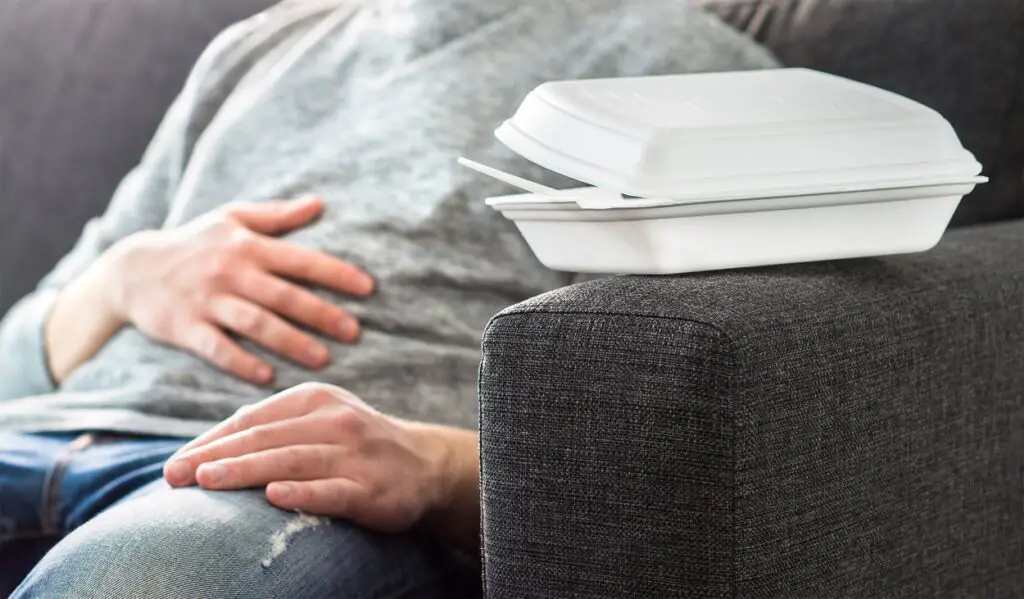Should you eat right before you go to bed? It’s a question that causes a lot of controversy, and health experts can go both ways on the topic.
Is it really bad to go to sleep on a full stomach? Let’s talk about some of the pros and cons, giving you what the health experts advise and helping you to make a more informed decision about when to eat and how it affects your bedtime.
Pro: Post-Meal Sleepiness
One of the obvious benefits of eating before you go to bed is that you can feel tired after you eat. Eating a full meal can you put your body into a restive state, slowing down your pulse, making your eyelids feel heavy, and giving you a sense of lethargy.
Have you ever felt like you need a nap after a big meal? It is probably something everyone feels after Thanksgiving or Christmas dinner. If you plan your meal to take place right before bedtime and you eat a full meal, you can fall asleep very quickly.
That’s definitely an advantage, particularly for people who have trouble going to sleep. They can use this post meal sleepiness to help them drift off into a very restful and peaceful sleep.
Eating a full meal before trying to sleep is a great way to ensure that you get plenty of deep sleep and you wake up feeling very rested and energetic.
Pro: No Hunger Pangs
Is it bad to sleep on a full stomach? There are drawbacks, but we think it’s important you should know why some people will eat a full meal before going to bed. There are definite benefits to be had.
Have you ever had trouble falling asleep because you were hungry, or have you ever woken up in the middle of the night or early in the morning feeling ravenous? You can avoid all that by eating before you go to bed and planning for your meal or snack to take place shortly before you fall asleep.
Con: Weight Gain
Why is it bad to go to sleep on a full stomach? For most people, the reason they avoid doing this is to avoid the weight gain that comes with it. When you eat food, your body will process the food and the glucose from what you eat will be turned into usable energy. If you don’t use that up, the glucose continues to pass through your bloodstream until it is turned into fatty deposits.
So, if you eat and don’t exert yourself at all and do you go into sedentary activity like sleeping, you will simply gain weight.
Your metabolism won’t be able to burn the calories fast enough, and what you ate will go onto your hips, arms, belly, and other areas where fat deposits.
Is it bad to sleep on a full stomach? It definitely is if you’re trying to lose weight or you’re trying to maintain your figure. Eating before you go to sleep can be disastrous for a weight loss plan and can set your results back.
Your schedule may be such that it’s difficult to space out your last meal for the day and when you go to bed. If that’s the case, you may want to try to eat less food for your last meal of the day or you may want to eat food that is low in fat, sugar, and carbohydrates. Try for a heavy snack or a light meal as opposed to a full meal, and this can help prevent weight gain.
You can actually lose weight by eating shortly before you go to bed. In order to do that, you have to carefully monitor what you eat and how much you eat. You can eat foods that won’t add much fat to your body or eat just enough food to get your metabolism kicking in. Whenever you eat, your metabolism starts to process the food. If you’re eating only a little food and getting your metabolism to start up, that can actually burn more fat than you consuming, leading to weight loss.
Con: Unhealthy Eating Habits
Another reason to avoid eating a full meal before bed is that it can cause you to develop poor eating habits. At the end of the day, we’re less likely to make smart, healthy choices. This is when we feel most tired and worn down. It’s when our defenses are down, and we’re more likely to choose foods that are unhealthy.
What many people do who are trying to lose weight is set cutoff time for themselves each night. They decide which time they will not eat after, whether it’s 7:00, 8:00, or 9:00 o’clock at night. This helps them avoid giving in to their late-night cravings and eating something unhealthy at an hour when their metabolism is less likely to do anything productive with it.
Eating a full meal late at night can be dangerous to your eating habits. Is it bad to go to sleep on a full stomach? It can be dangerous for some people because it encourages them to eat late at night when they normally would not.
Like we said, it can be tough to control your eating habits and make healthy decisions when you’re eating late. You are more likely go for the comfort food or the foods that are quick and easy to make. You may also be more likely to choose fast food, which tends to be unhealthy.
Closing Thoughts
There is a lot of confusion about before you go to bed. We looked up “Is it bad to sleep on a full stomach” on Yahoo and found plenty of results for articles talking about the negative side this habit. People are worried about what will happen to them if they eat a lot of food before they go to sleep. There is reason for concern there, and it is usually best to eat a small meal before bed or have just a snack. Or you can eat long before you go to bed.
This isn’t always possible for everybody, and we realize that. There isn’t a perfect solution that works for everyone. You have to find something that works for you and be aware of your schedule and your eating habits. If you feel like your eating is out of control and it’s affecting your health and your weight is ballooning, you may need to talk to your doctor for some help.
The advice we given you is general information that you can adapt to work with your schedule and your eating habits.
By making some small changes in how much you eat, which foods you eat, and when you eat, you can be a lot healthier, feel much better, sleep better, and keep your weight under control.
Getting a grip on what you eat before bedtime may be as simple as changing up your grocery shopping habits. It may mean changing up your sleep schedule, or it might mean planning ahead and cooking something up in the morning that you can eat at night that won’t compromise your diet.
There are lots of ways to make this work and to get around the problem of eating a full, healthy meal before you go to bed. Hopefully, this article helps you better understand why some people recommend eating a full meal before bed and others are totally against it. You have to decide for yourself what works best, and you should talk to your doctor before you make any major changes to your sleep schedule or diet, if you’re being treated for any illness, health problem, or disease.
My name is Ellis Francis and I have been a personal fitness trainer, sports nutritionalist and health and fitness advisor for over 25 years. I am the lead health and fitness advisor at https://awellnessbody.com.







